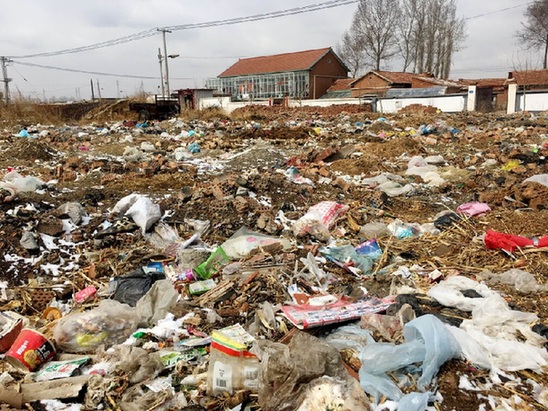Untreated landfills erode life in small northern county
- By Wu Jin
 0 Comment(s)
0 Comment(s) Print
Print E-mail China.org.cn, May 20, 2018
E-mail China.org.cn, May 20, 2018
When the snow started to melt after swirling down in the early spring, the land covered under the white facade gradually returned to its original appearance.
However, the change of seasons did not bring as much joy to the 3,100 residents of Fujia Wopu village of Ningcheng county in northern China's Inner Mongolia autonomous region as it did for others. The acrid smell of six unprocessed landfills in the county became increasingly unbearable when the snow thawed.

"I am longing so much to play outdoors, but the field makes me feel dizzy and nauseated," said Yuan Yuqi, a local boy aged eight.
In front of Yuan's home extends a field of 400 square meters filled with an enormous amount of garbage, including plastic bags, cow dung and even dead swine. Local residents are forced to put up with the pungent odors and innumerable flies, especially on hot days.
According to Ni Shujuan, Yuan's grandmother, people began dumping rubbish in the area seven to eight years ago when it was still a pit. However, the rubbish has been left untreated, which has consequently devastated the environment in the village.
The polluted land near Yuan's family is not an isolated case. Nearly 20 villages in the county are surrounded by similar landfills, where the rubbish has taken up not only the land but also ponds and rivers.
"The rubbish has spread everywhere in the village, frustrating not only the residents, but also the cattle," said Zhou Guoyu, a man from a village named Mazhan Chengzi. "The goats cannot put on weight while grazing plastic, and, more seriously, they will die from it," he complained.
However, what's more frustrating is that the rubbish that has sprawled into the Laoha River, a major river in the county.
"Who cares about the pollution in the river?" a resident surnamed Hai said while unloading waste from his tricycle.
When there is a sanitary inspection from higher authorities, other villages will surreptitiously transport their rubbish there, Hai added.
Rubbish has been piling up since 2014, when the Ningcheng county government asked all villages to gather rubbish at specified sites for centralized treatment. However, the rubbish was usually left untreated for months, and sometimes even for years.
Village officials insisted that the rubbish was left untreated because of funding shortage. "We are already 300,000 yuan (US$47,318) in debt, and the residents are unwilling to pay the money needed to clear out the garbage," said Wang Fengshan, head of Fujia Wopu village.
Beyond the rubbish, the extensive use of plastic mulch in farms makes the fragile ecosystem even worse, as the material is difficult to dissolve.
Crushed under tractors, the mulch is cut into pieces by the spinning blades. As a consequence, pieces of the mulch can be spotted flying in the air, hanging on branches, or buried under the soil, gradually causing the farmlands to lose fertility.
Some farmers chose to burn it, unleashing considerable pollution in the air and creating fire hazards.
Despite the damage that the mulch may cause in the long run, local resident are reluctant to abandon it for fear of rising labor and costs.
The devastated environment in Ningcheng county is only one example of China's rural dilemmas. Scholars and government officials have rendered proposals recently to create a more eco-friendly countryside.
Han Chengfu, a research fellow from the Inner Mongolian Academy of Social Sciences, said these villages should be financed to clear out the existing rubbish and employ cleaners regularly to deal with new garbage.
He also suggested the villages to try their best to seek economic growth, so as to have sufficient fund for such public projects.
Hai Zhenhua, the Party chief of Gangyingzi village, said the residents should sort their rubbish before having it sent to designated garbage plants for eco-friendly processing.
Yin Xuefeng, associate professor from the School of Environment and Resources at Inner Mongolia University, said that more efforts should be made to develop more eco-friendly mulch at lower costs and to promote a wide use of it.






Go to Forum >>0 Comment(s)